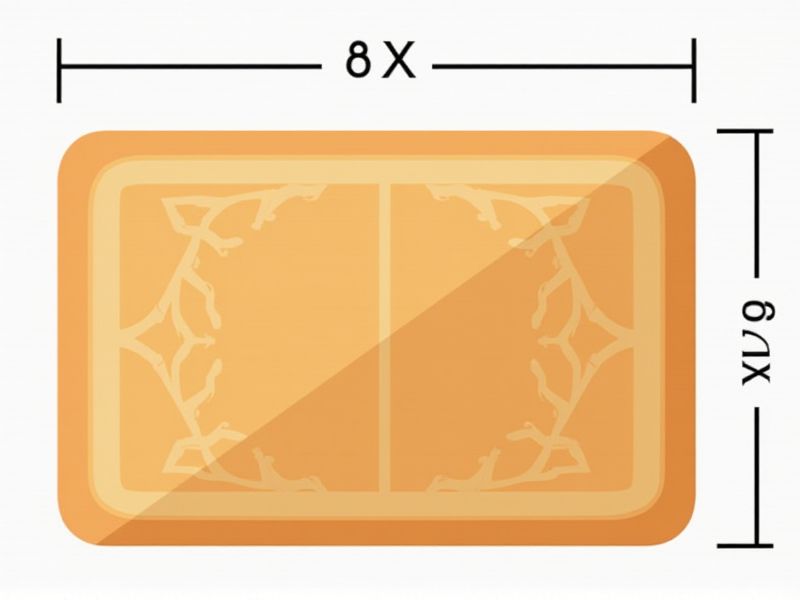
When selecting a doormat, it's helpful to know that standard dimensions usually range from 18 x 30 inches to 24 x 36 inches. Most entryway mats fall within this size, making them suitable for typical front doors, which are about 36 inches wide. If you have a double door or want extra coverage, consider larger sizes, such as 2 x 4 feet. Choosing the right size ensures your mat effectively traps dirt, fits well with your entryway, and enhances both function and appearance.
Aspect Ratio
The aspect ratio of a doormat is crucial for its aesthetic appeal and functionality; a common ratio is 2:1, ensuring a balanced look while accommodating foot traffic. Choosing the right dimensions, such as a 24-inch by 48-inch mat, offers sufficient space for multiple footwear types and enhances safety by preventing slips. If you opt for a smaller mat, consider a 18-inch by 30-inch size, which works well for single-door entries. Remember that the aspect ratio also influences how the doormat fits within your entryway, making it essential to measure your space accurately.
Length Measurements
The standard doormat typically measures 18 inches in width by 30 inches in length, providing ample coverage for most doorways. This size accommodates the average footwear dimensions, allowing for effective dirt and moisture capture as you enter your home. For larger entrances, consider doormats that extend up to 36 inches in length to ensure better dirt containment and aesthetic appeal. Selecting the right dimensions not only enhances functionality but also complements your home's exterior design.
Width Measurements
When selecting a doormat, the standard width typically ranges from 18 to 36 inches, catering to various entry sizes. A width of 24 inches is ideal for standard front doors, providing ample space for wiping shoes. For larger entrances, consider doormats exceeding 30 inches to enhance both functionality and aesthetic appeal. Your choice of width directly influences the first impression of your home, as well as effectively trapping dirt and moisture from footwear.
Thickness Standard
The thickness of a doormat significantly impacts its functionality and durability, with a standard thickness typically ranging from 1/4 inch to 1/2 inch. A thicker doormat, around 1/2 inch, offers enhanced durability and can withstand heavy foot traffic, making it ideal for commercial settings. In contrast, a thinner doormat, approximately 1/4 inch, may be better suited for residential entryways where style and ease of cleaning are priorities. Choosing the right thickness not only improves safety by reducing trip hazards but also ensures effective dirt and moisture trapping, maintaining a clean entryway.
Material Type
The material type of doormats significantly influences their durability and effectiveness; common materials include coir, rubber, and polypropylene. Coir mats, made from coconut husks, are known for their ability to trap dirt and moisture, making them ideal for outdoor use, while rubber mats provide excellent slip resistance and weather durability. Polypropylene is lightweight, resistant to mildew, and easily washable, making it suitable for both indoor and outdoor applications. Choosing the right material based on your specific needs can enhance the longevity and functionality of your doormat.
Size Regulations
Doormat size regulations vary widely, with many homes and businesses opting for dimensions of 18 by 30 inches as the standard entry mat. This size is generally recommended to effectively accommodate foot traffic and ensure proper dirt removal. When considering outdoor doormats, dimensions of 24 by 36 inches or larger are often preferred for spaces that see heavier use. You may also find that custom sizes are available, allowing you to optimize your entryway while adhering to local building codes for safety and accessibility.
Manufacturing Guidelines
Manufacturing guidelines for doormats emphasize the importance of materials such as polypropylene, rubber, or coir, ensuring durability and weather resistance. High-quality doormats typically feature a thickness range of 0.5 inches to 1 inch, providing effective scraping action to keep dirt and debris outside. Production processes should adhere to eco-friendly practices, with some manufacturers utilizing recycled materials, reducing environmental impact. Your doormat should also meet safety standards, preventing slippage with appropriate backing, which is crucial for both residential and commercial settings.
Popular Dimensions
Popular doormat dimensions typically include 18x30 inches, which effectively accommodates most standard door sizes. For larger entryways, you might consider doormats measuring 24x36 inches or even 30x48 inches, providing ample surface area for guests to wipe their feet. Thickness also plays a role, with options ranging from 0.5 to 1.5 inches, ensuring compatibility with door clearance. When selecting your doormat, prioritize both size and functionality to enhance your home's entryway aesthetics and hygiene.
Market Trends
The doormat market has seen a significant shift, with 25% of consumers prioritizing eco-friendly materials in their purchases as of 2023. Increased demand for personalized designs has led to a 15% rise in sales of customizable doormats, appealing to your desire for unique home decor. The industry is projected to grow at a CAGR of 5.5% over the next five years, as urbanization and home improvement trends continue to gain momentum. Furthermore, online sales channels now account for 40% of total market revenue, reflecting a growing preference for convenient shopping experiences.
Usage Specifications
When selecting a doormat, consider its usage specifications tailored to different environments. Indoor doormats typically measure around 18 to 24 inches in width, designed to trap dust and moisture efficiently, while outdoor mats often range from 24 to 36 inches and are built to withstand various weather conditions. Look for materials like coir, rubber, or synthetic fiber, which offer durability and effective cleaning capabilities. Ensure the doormat has a non-slip backing, providing safety and stability for your household, especially in high-traffic entryways.
